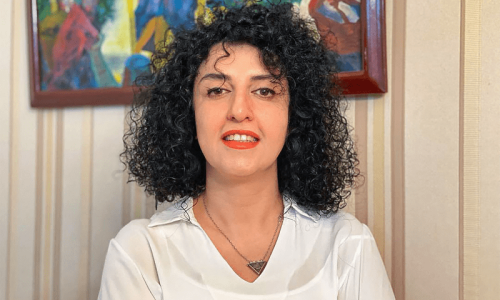ZAGREB, April 5: US President George W. Bush said on Saturday that Nato was open to all countries in the volatile Balkans region to help guarantee security and stability, in a speech in Zagreb before leaving for Russia.
“The Nato alliance is open to all countries in the region,” Bush told some 3,500 people, including leaders of Croatia, Albania and Macedonia, in Zagreb’s St Mark’s Square.
Nato leaders invited Zagreb and Tirana to join the alliance at a summit in Romania earlier this week, but decided not to invite Skopje until a long-running dispute with Greece regarding Macedonia’s name was resolved.
The two countries will become the 27th and 28th members of Nato once the accession and ratification process has been finalised, which alliance officials hope can be accomplished within a year.
Bush said the decision on Albania and Croatia was a “vote of confidence that you will continue to make necessary reforms and be strong contributors” to Nato.
“Should a danger threaten your people, America and the Nato alliance will stand with you and no one will be able to take your freedom away.” Bush regretted that Macedonia was not invited.
“America’s position is clear, Macedonia should take its place in Nato as soon as possible.” Prime Minister Ivo Sanader, who also spoke at the square, publicly encouraged Croatia’s neighbours: “Don’t give up! Inclusion of the whole European southeast in Euro-Atlantic integrations will continue.” Bush also cited contributions by Albania, Croatia and Macedonia in Afghanistan, as well as by Albania and Macedonia to Iraq.
“It’s only a matter of time before freedom takes root across that troubled region,” he said in reference to Afghanistan and Iraq.
People needed special invitations to attend Bush’s speech, delivered amid heavy security.
In his speech Bush did not mention ex-Soviet states Ukraine and Georgia, which during the summit, despite strong US support, were not included in the Membership Action Plan (MAP), which means official Nato candidate status.
Nevertheless Nato told the two they would be admitted in the future, shrugging off strong objections by Russian President Vladimir Putin.
Bush arrived for a 24-hour visit to Croatia on yesterday when he met President Stipe Mesic and had dinner with some 60 of the country’s top sports people, artists and politicians.
On Friday dozens of protestors gathered in central Zagreb carrying banners reading “Nato stinks”, “United States of Aggression” and “Bush the bloodthirsty dictator,” holding a picture of him next to one of Adolf Hitler.
On Saturday dozens in Zagreb signed a giant postcard urging Bush “not to come back” to the country, an correspondent said.
“Please don’t come back!” read in English the front of the 1.5-meter high and two-meter wide postcard.
Police prevented the protestors handing it over to Bush so they brought it to the foreign ministry where they were promised that it will be delivered to him.
From Zagreb, Bush left for the Russian Black Sea resort of Sochi where he is to have his last meeting with President Vladimir Putin before the Russian leader steps down next month.
Local analysts underline that the United States as the leading Western power wants to boost its position in the Balkans region, which saw a series of bloody wars in the 1990s during the break-up of Yugoslavia.
They point notably to potentially unstable Serbia, strongly backed by Russia. Serbia was enraged when the province of Kosovo proclaimed independence from it in February.
Croatia’s leaders define membership of Nato, as well as the European Union, which Zagreb hopes to join by 2010, as its strategic goals.
However, in the past ties between Zagreb and Washington have not always been warm, notably during the rule of the late autocratic president Franjo Tudjman, who died in 1999.
—AFP














































Dear visitor, the comments section is undergoing an overhaul and will return soon.